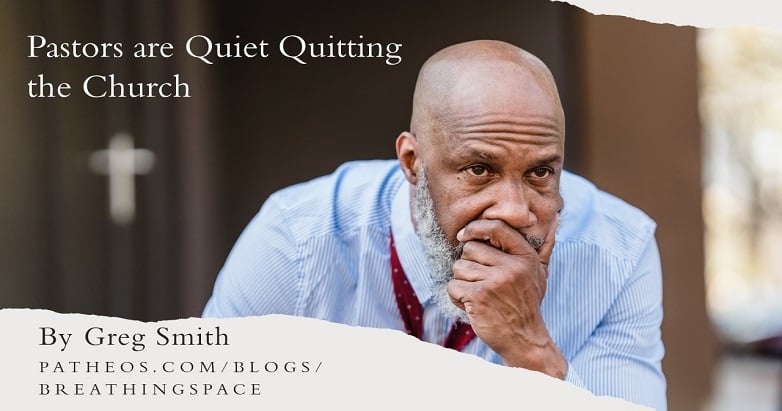Many pastors are quiet quitting the church. If you’re unfamiliar with that term, it’s come up a lot lately in reference to the Great Resignation. Employers are realizing that, just like the Twisted Sister song, their employees are “not gonna take it anymore.” Partially due to COVID, but more due to economic and work environment factors, employees are quitting in droves. But many who can’t afford to actually are quiet quitting. Countless ministers have joined in the Great Resignation. Many more pastors are quiet quitting the Church.

Quiet quitting is when you keep your job, but you don’t do any more than is expected of you. Why would people do this? Employees have realized that they are not valued by their employers. No matter what they do, they aren’t getting ahead. Pretty soon you stop going above and beyond. If the company isn’t interested in your advancement, it’s not long before you quit being interested in the company’s progress. So, you keep your head down, do your job, punch out at 5:00, and go home to enjoy your family. This is quiet quitting. Millions of workers have figured it out. And many pastors have, too.
Why Pastors are Quiet Quitting the Church
There are many reasons why pastors are quiet quitting the church. Here are four of them:
- Pastors are notoriously underpaid. Along with church decline has come salary decline. Many pastors have taken drastic pay cuts over the last few years. Full-time pastors have become bivocational. If they haven’t lost actual pay, they’ve lost benefits like employer-provided health insurance. But while their salary package has decreased, their congregations’ expectations remain the same. Perhaps their workload has even increased, as the church has had to let go of support staff.
- Churches discourage pastors from taking vacation time. With the decrease in salary, pastors’ budgets for a distant vacation have also declined. But when a pastor takes a staycation, the congregation does not recognize their need for time off. Multiple times, I have done funerals for church members when I was on staycation. Once when a church member died, I was required to abbreviate a trip to Disney with my family. That was time my kids could never get back. When churches don’t respect a pastor’s vacation time, it sends the message that they don’t care about their pastoral family’s well-being.
- Constant criticism is another reason why pastors are quiet quitting the church. When every decision is wrong, your solution is to quit making decisions. You stop offering leadership when you realize your church doesn’t appreciate your guidance. You quit sharing your opinion when they make it evident that they don’t want your input. In ministry, it’s always been impossible to make everyone happy. But in the past few years, it has become difficult to keep the torches and pitchforks at bay. It’s easier to keep your head down, let the church board do the leading, and keep your sermons to niceties.
- Pastors quiet quit when their congregation doesn’t give them the breathing space they need to grow. I recall problems when I adjusted my preaching style, expressed evolving theology, and changed tried on a new approach to church management. When the church penalizes ministers for personal, professional, and spiritual growth, it invites stagnation—which is what many in the congregation secretly want. Many church members find their lives constantly changing around them, so what they want more than anything else is for their church (and their pastor, by extension) to stay the same.
When I Quiet Quit the Church
Years ago, I served a congregation that didn’t want to reach its community. I tried outreach. I tried innovation. I tried inspiration. No matter what I did, that church didn’t want to do anything to impact the neighborhood around it. It wanted to serve itself. It wanted its social gatherings and Sunday services. But the last thing it wanted was to make a difference. I loved the people there and didn’t believe it was my time to leave. So, I quiet quit the church. For me, this meant that I continued preaching and teaching. I married them and buried them. I dedicated babies and baptized believers. But I wasn’t going to be the only person in the church trying to make an impact. So, I settled down and became their chaplain instead of their pastor. And I functioned that way until I actually did quit–and went to a church that wanted to thrive.
I’m not saying it was the right thing to do. I’m not justifying my decision. What I’m saying is that many churches make it so difficult to lead them that their pastors just give up. Out of a sense of calling, and because of their love for the people, they remain. But remaining is about all they can do. It’s not that they don’t care. Please don’t call them false shepherds or blind guides. They are women and men who are hurting and discouraged, who don’t have the support that they need to do the job that God and their congregations called them to do. Here are some ways you can help:
Pastors Need a 500-Pound Gorilla
Once, I read a study about pastors who had longevity in their churches. Surveyors asked them how they could serve so long in one congregation. Across the board, they agreed on one thing. They all had a 500-pound gorilla on their side.
Over the years, pastors have learned not to speak up too loudly in business meetings. They have been taught not to defend themselves, even when accused unjustly. Pastors are great at advocating for the needs of others. But they have been shut down so many times when they speak up for themselves, that they don’t have a voice anymore. What they need in their churches is a 500-pound gorilla to stand in the gap for them.
Pastors need someone who can pray for them, certainly. But more than that, they need someone to stand with them. In business meetings and committees, they need someone to represent the pastor’s interests, because pastors aren’t allowed to represent their own. They need an ally who will advocate for a minister’s self-care. Someone who will insist on 4 weeks of vacation. Someone who will carry the standard of new initiatives that the pastor suggests. They need a friend who will defend the pastor when they are criticized for not using their one day off with their family to spearhead a weekend retreat. Maybe God is calling you to be your minister’s 500-pound gorilla.
Pastors Need to You to Love Their Families
Another thing pastors need is for their families to feel loved. I’m not talking about honoring the first lady of the church. I’m talking about welcoming her as a friend. Inviting her into your inner circle. And if your pastor’s spouse is male, you need to do the same thing. Pastors need volunteers who will offer free babysitting for clergy kids whenever the minister needs to conduct a funeral or visit someone in the hospital, and the other parent is unavailable. And those children need other kids in the congregation who will become their bosom friends. The pastor needs people who will not just say, “We need to go fishing someday,” but people who will actually follow through with a real invitation that involves a time and date. In other words, the whole family needs to know they are loved and supported.
Give Your Pastor Breathing Space
Give your pastor breathing space to grow spiritually. If it sounds like your pastor is preaching theology different from what you’re used to, don’t be critical. If it’s a different gospel entirely, that’s one thing. But if your pastor is trying on different theological hats, that’s a good thing. Too many ministers feel so pigeonholed that there isn’t any room to expand their viewpoint. And if they do grow spiritually, they feel like they can’t share it with anyone.
You can help your pastor by encouraging variations of thought and being receptive to new things yourself. When you give your pastor the space to grow professionally, you’ll see her begin to thrive. When you tell your minister to take a hike—and offer to join him in the mountains—you help him to breathe and grow. Clergy that feels well-tended, well-adjusted, and well-loved will generally remain in their ministry setting. Pastors are quiet quitting the church—but your minister doesn’t have to be one of them.












